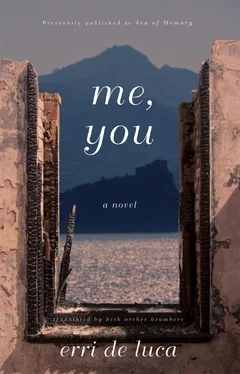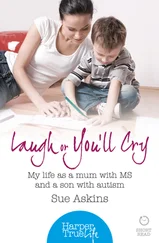Caia was leaning on my arms and I was so close to her that her hair was just inches from my eyes. For a while she would watch the film, then look up at the night that roofed the movie house. She would turn away from the story by leaning her head back slightly, bringing it closer to mine. I would then press my forehead against it and while she opened her eyes wide to the darkness of the sky, I would close mine in the back of her neck. I listened to the beat of the pulse in my wrist which was holding up her head. I felt the emptiness around us. We were a tight cluster of grapes about to be picked. The cluster trembles at the arrival of the harvesters, the stem vibrates with pain at the sound of the nearby scythes, but not us; we were steadfast and ready for the hand that would pluck us from that summer to make of us the fruit of a harvest.
At the end of the film, when Daniele’s German girlfriend began to cry and someone else reached for a handkerchief and blew her nose, I wanted to say that there was nothing to cry about, that the two people in the story had shared a love, and that tears were a mistake because it was right, it was right like that. Caia rose up from the chair and my arms felt bare, but also free to move, no longer bound by the duty to serve as her support. The group broke up in last farewells, yawns, wisecracks.
“You’re a good cushion.”
“And you’re a rascal.”
Seeing him head toward the beach arm in arm with the German girl, someone called out, “Daniele, don’t you know you live on the other side?” Before taking leave of the summer crowd, I managed to say without lowering my voice, “Good night, Chaiele.”
I was alone. In my numbed arms a repressed strength was building up. My stomach muscles were so hard I could count them under my fingers. I was ready.
That night I sucked gasoline through the rubber hose from the tank of my father’s car, filling the demijohn with five liters. I stoppered it with the cork and hid it. I did not go to the pensione for a final inspection, so as not to risk Daniele’s return to our room before me. It was Caia’s last night on the island. We had left each other with an appointment for the next day. I would carry her suitcase to the pier and we would walk together one more time.

Daniele came home late, completely disheveled. He had scored with the German girl and wanted to talk.
“Funny, one night you get into a fight with Germans and the next you make love with a German girl who’s bright and amusing. What bizarre people.”
“It could be that the children are better than the parents,” I replied. “But look at you, you look as though you got into a worse fight tonight. That girl avenged her compatriots.”
“You’re right, it was a terrible vengeance, I can hardly stand up and my neck is full of bites. I couldn’t help laughing at the memory of the night before. I tried to tell her that we got into a fight with Nazis. Hearing that word, she made a face of disgust and said Scheisse , meaning shit, Caia explained to me. A propos, you disappeared in the middle of the festival. I thought the two of you had gone off to say good-bye.”
His familiarity suddenly struck me as inappropriate.
“No, we were surrounded by the crowd and we walked around the stands. But what about you?” I asked, to get Caia out of the conversation. “How did you meet the two girls?”
I didn’t want anyone to talk about Caia again. I would have erased her from everybody’s mind to keep her apart from the jumbled memories of a summer. I wanted to be the sole custodian of her name.
“It was easy, they couldn’t make themselves understood by a vendor about the price of a brush. I intervened as interpreter. He was ripping them off. Then I offered them a slice of watermelon and finally you arrived with Caia and we had an official interpreter.”
Once again a drop of acid rose in my throat at the sound of her name. I would have liked to correct him and tell him that her name was Chaie — Chaiele for me — and that even he, Daniele, had come close to her without knowing her. I went back to my diversionary tactic: “They were all alone, there wasn’t anybody with them?”
“Completely alone. They arrived just in time for the festival. They come from Cologne, a city still in ruins, much worse than ours. It seems that after the war the only things still surviving were the cathedral and the Rhine. They grew up playing hide and seek in the rubble. They’re fun. Marion was wild for kisses. Pity I’m leaving tomorrow.”

Yes, leave, travel with Caia, take her to the train, in safety. What will happen here won’t be able to touch her. She will be far away, she will be sleeping when a boy descends from his house at night to set a fire. It will be a fire far from her, from the losses she suffered, it will be a fire that won’t compensate her, won’t remove a single thorn. It’s her father’s fire. Chaiele, you wanted me to be like this, you gave me another name, you brought about unknown gestures in my body and a blood bond with you. I entrust you to Daniele; he will take you to safety before the fire.
Thoughts, decisive thoughts, were taking root in the center of my brain while I sat on the bed not listening to the end of that older boy’s account of his evening. Good night. I grew up in the wake of your suffering, but before knowing you I spent a year asking books in what century I was living, and on what ground I trod. Meeting you was like the sun splitting my skin and the rough rocks hardening the soles of my feet. You made another skin grow over mine. You gave me access to the world by calling me yours. When you have left I will show what I’m capable of with my fire. It’s not mine, I inherited it. I inherited your mourning along with the action that another father did not take in his lifetime. I inherited his debt, a fire in filial hands. You, Chaiele, called me Tateh . I accept it herewith. Tomorrow night I will be your tateh and I will burn your persecutors. It may be late to stop them, but it is only now that am I alive.
“Good night. Come on, let’s go to sleep.”
“Yes, Daniele, good night to you.”

Day came, and with it the sirocco that raised dust as high as the eyes. I left a note for Daniele, “See you at the port,” but I couldn’t get myself to write “with Caia.” I was at her house early and was astonished that she was all ready to go. She said good-bye to her hosts, to the friend who had offered her that summer holiday on the island in exchange for her kindness at boarding school. She had left a beautiful gift for her. It was only then that I realized Caia must have means. I was the object of a few discreet witticisms about being her cavalier, but, like a good valet, I maintained my reserve. We left amid farewells and I expressed surprise over her single suitcase.
“I’m leaving everything here, I have no further use for summer clothes. I don’t believe there will be another summer at the seashore. After this one it’s not possible to wish for another.” She spoke softly, making it hard to determine whether she was relieved or regretful. Because of the wind, she had tied a silk scarf around her hair and put on sunglasses. We walked past the beaches. The umbrellas were closed, few chairs were open, hardly any people.
The sea was beginning to swell. “It won’t be an easy crossing,” I said.
“Better that way. I’ll think more about the sea and less about the land behind me. I came wanting to play at freedom. Now that I’ve finished secondary school, I’ll go on to the university. I had a wonderful time here in this cordial, carefree south where a kiss lasts no time at all, less than diving into water. But it couldn’t go on that smoothly. That’s how you came along — gesturing like my father, discovering my background, my suffering as a child. You, a boy with your first trace of beard, covered with salt and the smell of fish, what the devil do you have to do with my father? And yet he chose you in order to be close to me, lovingly, steadily. And during his visit I became a child again. You gave me this. Last night at the festival I was happy to be your daughter. It made up for all the missing years. In that holiday crowd I relived half of the life I lost without him. I don’t know what I did to you, kid, and I don’t want to know. You came to me as a gift and I called you mine because my father was there, in you and on you. I don’t know what we did to you. We took hold of you as the only hand that could bring our hands together. We besieged you with our need to find each other one last time. I can’t even offer to apologize because for me this was a blessing.”
Читать дальше













